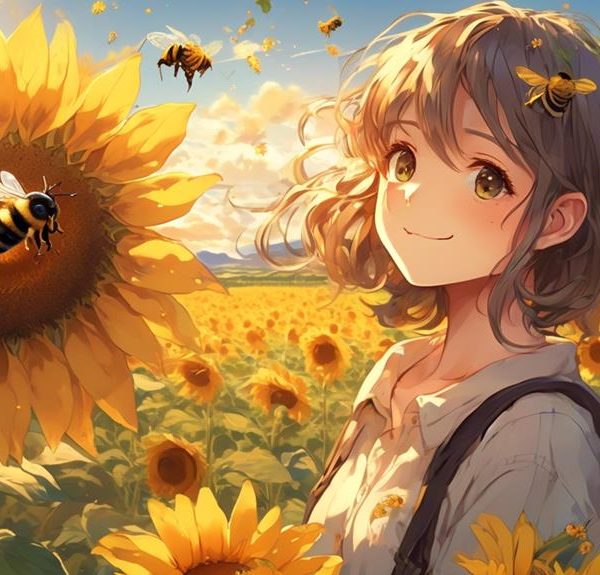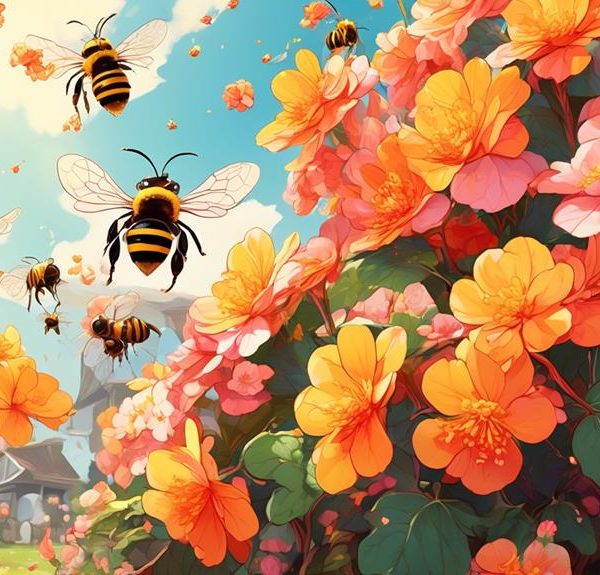Savor the surprising connection between bees and beer in this intriguing exploration; you'll never see your summer pint the same way again.
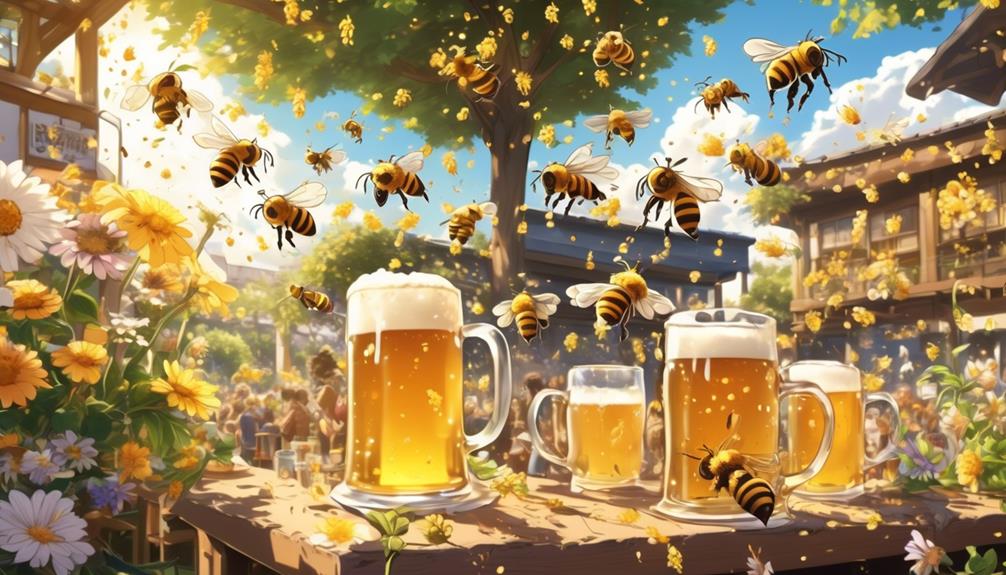
Do Bees Like Beer
Just as you might be drawn to a cold pint after a long day, you may have noticed bees swarming around your beer at a summer barbecue. You're probably wondering why these buzzing creatures are interested in your brew. Is it the scent, the color, or the taste? Is it just a coincidence, or do bees actually like beer?
As we investigate this curious phenomenon, you'll discover the fascinating relationship between bees and beer, and by the end, you might find yourself viewing your next outdoor drink in a whole new light.
Key Takeaways
- Bees are attracted to the sweet sugars in beer, particularly fructose, which is easily metabolized by bees.
- The fermentation process in beer breaks down complex sugars into simpler ones that bees can digest easily.
- Alcohol in beer affects bees' nervous system and impairs their motor functions, leading to disorientation and erratic flight paths.
- Long-term exposure to alcohol can decrease bees' lifespan, reproductive capabilities, and weaken their immune systems.
Understanding Bees' Attraction to Sugars
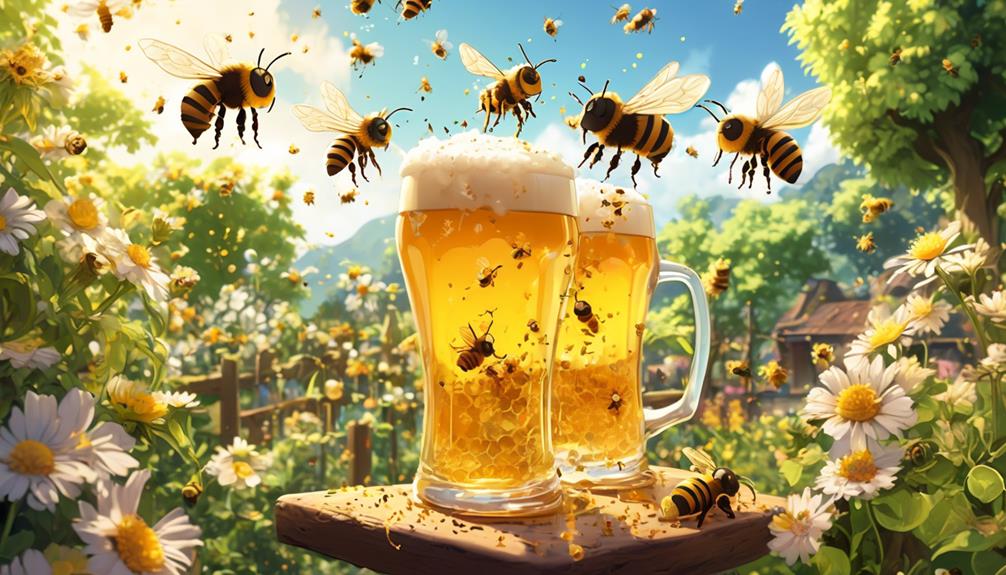
In the world of bees, their attraction to sugars, particularly the monosaccharide fructose found in nectar and beer, plays a crucial role in their behavior and survival. You see, bees have a keen sense of taste that allows them to detect sugars in varying concentrations. It's a survival mechanism that helps them locate food sources, primarily the sweet nectar of flowers.
Fructose is a simple sugar that readily dissolves in water and is easily metabolized by bees, providing them with quick energy. When a bee encounters fructose, its proboscis – a long, tubular tongue – extends instinctively, a phenomenon referred to as the proboscis extension reflex. This reflexive action indicates the bee's desire for the sugar source.
But why beer, you might ask? Well, beer contains residual sugars, including fructose, left over from the fermentation process. While it's not their preferred source of nectar, bees are attracted to its sweetness in the absence of better options. However, it's important to note that excessive beer consumption can be harmful to bees, affecting their ability to fly and navigate. So, while bees can be lured by beer's sweetness, it isn't an ideal food source for them.
Beer Ingredients: A Bee's Perspective
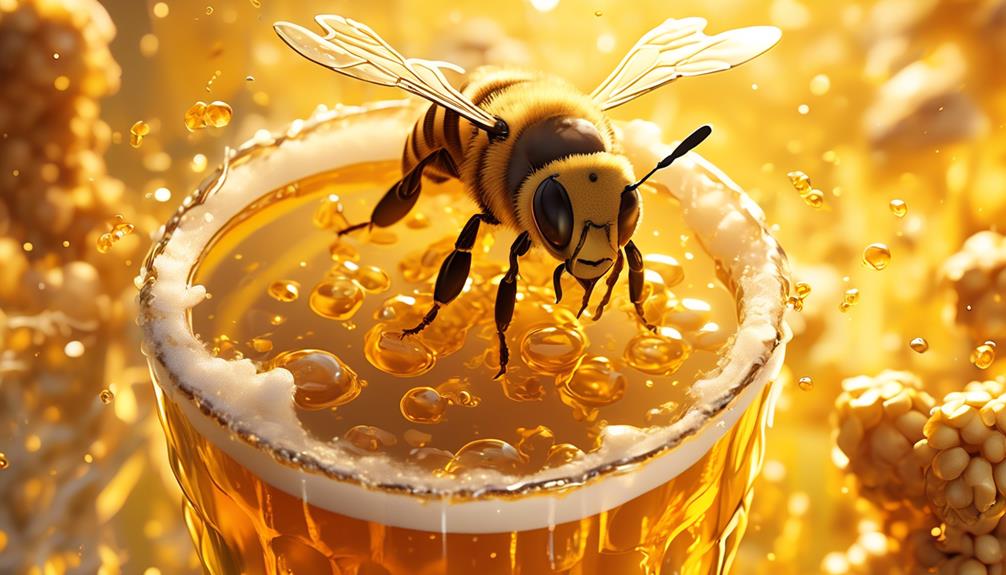
From a bee's perspective, the ingredients in beer, specifically the residual sugars, hold a certain allure despite not being their ideal source of food. It's not the alcohol that attracts them, but the sweet, fermenting sugars. Now, you may be wondering, why would a bee be attracted to beer?
Bees rely on nectar, which is primarily made up of sucrose, a complex sugar. However, the fermentation process in beer breaks down complex sugars into simpler ones, like glucose and maltose, which bees can digest more easily.
Barley, another ingredient in beer, doesn't directly attract bees. However, the brewing process often incorporates honey, a well-known bee attractant. It's essential to note that the presence of bees around your beer doesn't mean they're becoming alcoholics. They're merely foraging for easy-to-digest sugars.
While beer ingredients aren't harmful to bees in small amounts, excessive consumption can be detrimental to their health and behaviour. They can become disoriented, less effective at foraging and more susceptible to predators. So, while bees may be drawn to your pint, it's best to keep them at bay for their own good.
The Effects of Alcohol on Bees
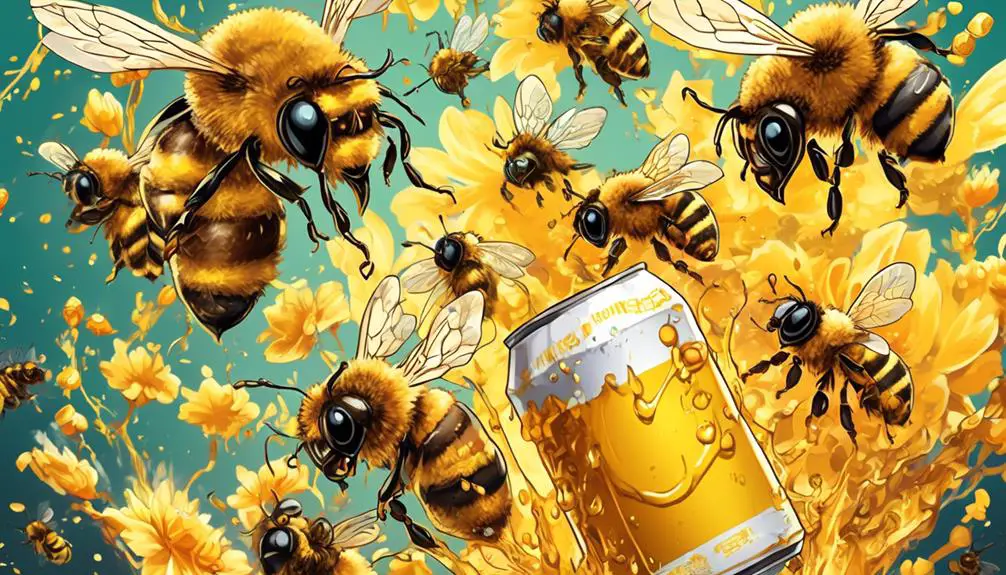
While it's clear that bees are drawn to the sugars in beer, it's important to understand the impact of alcohol on these insects. Just like in humans, the ethanol in beer affects bees' nervous system, leading to impaired motor functions and behavioural changes.
Studies have shown that bees, when exposed to alcohol, exhibit signs of intoxication, such as disorientation, erratic flight paths, and difficulty navigating. They're also less able to perform tasks vital to their survival, like foraging for food and communicating with their hive.
What's more, bees metabolize alcohol much slower than humans do, meaning the effects last longer and can be more damaging. Long-term exposure can lead to a decrease in their lifespan and reproductive capabilities. It can also weaken their immune systems, making them more susceptible to diseases and parasites.
Scientific Research on Bees and Beer
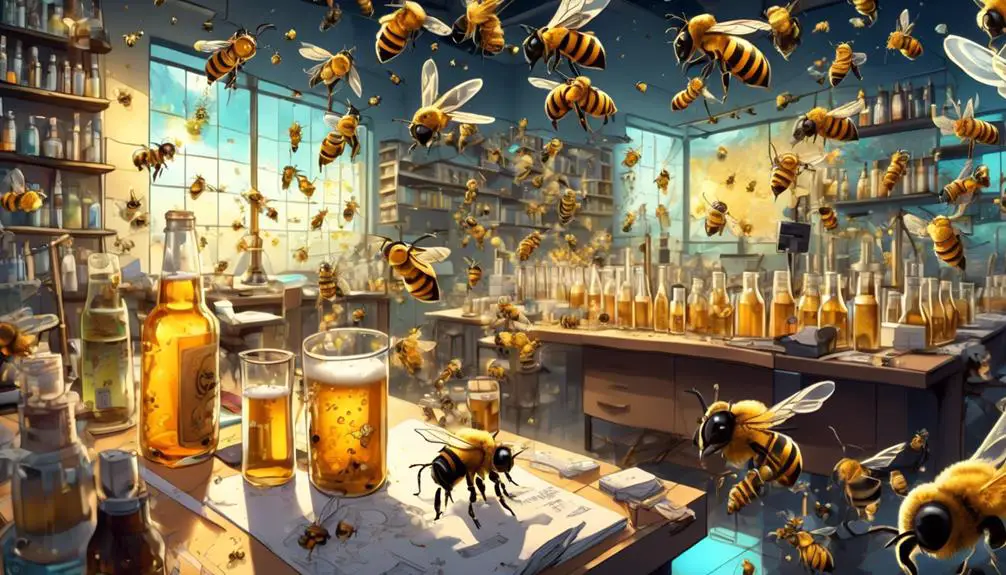
Diving into the realm of scientific research, you'll find a number of studies investigating the curious relationship between bees and beer. Scientists have discovered that bees are attracted to the aroma of beer, particularly the yeasts that are used in its fermentation process. These yeasts produce compounds called esters, which are often found in flowers, a bee's natural source of food.
In a 2015 study, researchers discovered that bees aren't only attracted to these esters, but they can also distinguish between different types and concentrations. This ability helps them locate food sources in their environment, but it also makes them susceptible to the allure of beer.
But it's not all suds and sunshine for these little insects. Too much exposure to alcohol can have harmful effects on bees, affecting their ability to fly and compromising their immune system.
How to Deter Bees From Your Beer
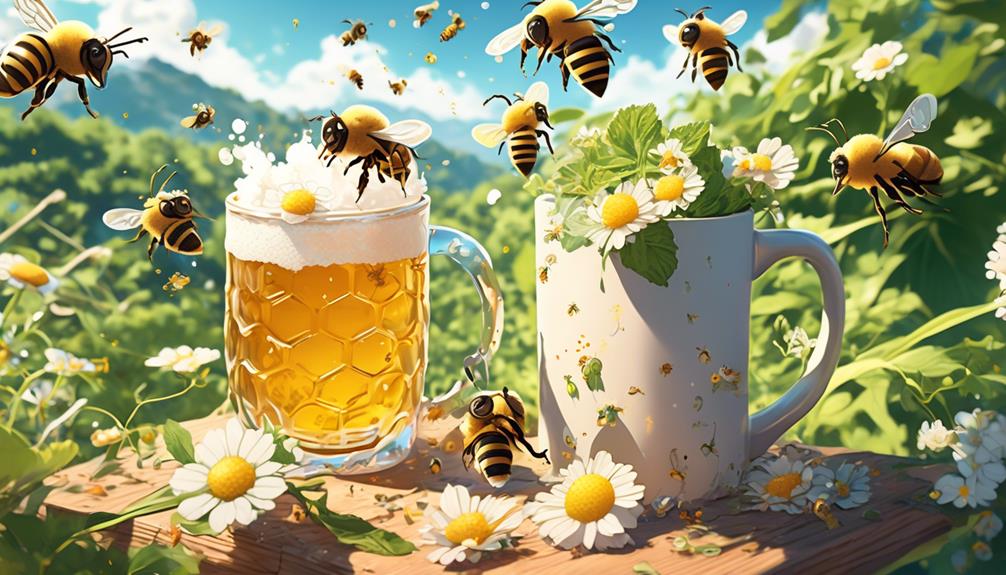
If you're looking to enjoy a cold brew without the buzz of bees, there are several proven strategies to keep these insects at bay.
First, use a bee deterrent, such as a decoy food source. Bees are attracted to sugary substances, so placing a dish of sugar water away from your beer can divert their attention.
Second, limit your exposure. Bees are attracted to beer's fermentation odors, so keeping your beer covered when not in use can reduce the chance of attracting them. A simple drink lid or cup cover can work wonders.
Third, consider your surroundings. Bees are less active in cool, windy, or rainy weather. So, if you're planning an outdoor beer event, keep an eye on the forecast.
Lastly, be mindful of your clothing and scents. Bright colors and floral perfumes can attract bees, so opt for neutral colors and unscented products when enjoying your beer outside.
Frequently Asked Questions
How Does a Bee's Affinity for Beer Impact the Beekeeping Industry?
Your beekeeping operations could be impacted if bees develop a liking for beer. Bees, attracted to its sweet, fermented smell, might ignore nectar and pollen. This changes their diet, potentially affecting their health and honey production.
Plus, intoxicated bees can't find their way home, reducing your hive's population. So, it's crucial you're conscious of any beer or fermented substances near your hives, adjusting as necessary to protect your bees and your business.
Can Bees Get Intoxicated if They Consume Too Much Beer?
Yes, bees can get intoxicated if they consume too much beer. Just like humans, bees can be affected by alcohol. Consuming beer can disrupt their ability to fly and navigate, which is crucial for their survival.
They can become disoriented and even aggressive. It's not healthy for them and can negatively impact their lifespan and productivity.
Are There Any Specific Types of Beer That Bees Are More Attracted To?
You might be surprised to learn that bees are indeed attracted to certain types of beer. They're particularly drawn to the sweet aromas of fruity, floral beers. The sugars and yeasts in these beers mimic some of the natural scents bees seek out.
But remember, beer isn't healthy for bees. It's best to keep your brews covered when you're enjoying them outdoors.
What Other Alcoholic Beverages Are Bees Attracted to Apart From Beer?
You're curious about other alcoholic drinks bees might fancy, not just beer. Well, studies have shown that bees can be attracted to various fermented sugars, which includes many alcoholic beverages like wine and cider.
However, it's not the alcohol they're after, but the sweet, sugary content. They're not discerning drinkers, so they're likely to be attracted to any drink that's sweet!
But remember, alcohol is harmful to bees, just like it can be to humans.
Can the Consumption of Beer Affect a Bee's Ability to Navigate or Communicate?
Yes, consuming beer can affect a bee's ability to navigate or communicate. Alcohol impairs their flight and directional capabilities. It also affects their ability to perform the 'waggle dance', a crucial communication method among bees.
It's similar to how alcohol impacts human coordination and speech. So, while they might be attracted to the sweetness of beer, it's certainly not beneficial for them.
Conclusion
So, do bees like beer?
Undeniably, they're attracted to the sugars in its ingredients. However, alcohol's effects on bees aren't beneficial.
Recent research even suggests bees may be deterred from flower nectar mimicking beer's alcohol content.
If you're looking to enjoy a cold one undisturbed, consider using bee deterrent methods.
Remember, while they may buzz around your drink, their interaction with beer isn't exactly a 'love story'.
Be mindful of our bee friends and their well-being.

